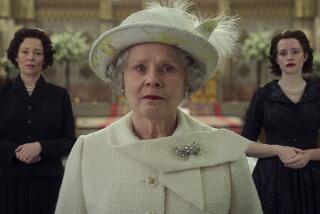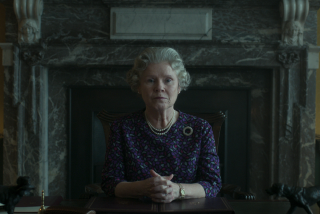TV REVIEW : ‘Queen’ Less Than Previous ‘Roots’ Sagas
- Share via
In these days of gratuitous crime movies, it’s refreshing to see a grandly staged, old-fashioned miniseries that sweeps through history on great crescendos of soupy melodrama.
On the other hand, there’s not much else that is invigorating about CBS’ “Queen,” the three-part story that celebrated “Roots” author Alex Haley was working on when he died a year ago.
Tracing the tumultuous odyssey of Haley’s paternal grandmother, Queen Haley, it airs at 9 p.m. Sunday, Tuesday and Thursday on Channels 2 and 8, rarely rising above safe, predictable, middle-brow entertainment even as it strives to comment about U.S. race relations in the second half of the 19th Century.
“Queen” is watchable enough as a character study/period adventure: Action, romance, pathos, costumes, triumph over adversity, the works. Yet the character Queen (played by Halle Berry) becomes a single note that resonates monotonously for much of the six hours. And, despite its interracial theme, “Queen” mainly reinvents the wheel, having little to say about slave owners, slaves and the lingering slave owner/slave mentalities that hasn’t already been better expressed in “Roots” and “Roots: The Next Generations,” those late 1970s blockbusters about Haley’s maternal ancestors.
British screenwriter David Stevens (“Breaker Morant”) was hired to write the script for “Queen,” which begins on a Florence, Ala., plantation in the late 1830s. It’s here that ongoing trysts between Haley’s slave great-grandmother, Easter (Jasmine Guy), and the benevolent young massuh , James Jackson Jr. (Tim Daly)--such slave/slave owner liaisons were not uncommon--produces a child whose skin is “just as white as cotton.” Her name is Queen, and her mixed lineage and light skin will turn out to be both an advantage and a curse for most of her years, creating a disorienting identity crisis while suspending her in racial limbo.
The Civil War will ultimately sever Queen from the plantation, but not from her roots or emotional chains as she makes her way through life, sometimes trying to pass as white, twice becoming a mother and wending through a minefield of adventures before achieving at least some serenity before the final credits.
Having directed parts of the two earlier “Roots” miniseries, “Queen’s” John Erman has world-class experience in guiding sprawling historical sagas for television. Yet almost immediately, “Queen” impales itself on its own devices when Erman has Easter in labor with Queen at precisely the same time James is proposing to his future wife, Lizzie (Patricia Clarkson). One artificial coincidence feeds another, for at the precise time that a Jackson dinner guest raises the issue of racial mixing, Easter’s slave father (Paul Winfield) bursts into the dining room with the news: “Slave child jus’ been born!” James and Easter’s child.
Although not lethally damaging, Berry is not quite up to being the center of such a marathon story. She’s inconsistent, at times moving you with great swells of rage and passion, other times mechanically speaking her lines (“I do exist, missy, and I gotta right to a little bit a love, and if I can’t get it here, I get it somewhere else”) as if reading from cue cards.
The strongest components of “Queen” are some of its supporting players, from Ann-Margret as the elderly Jackson matriarch to Dennis Haysbert as a former slave who fathers Queen’s first child to Danny Glover as Alec Haley, the widowed ferryboat captain with whom Queen ultimately finds relative happiness.
More happiness, perhaps, than some viewers will receive from watching this production from start to finish.
More to Read
The complete guide to home viewing
Get Screen Gab for everything about the TV shows and streaming movies everyone’s talking about.
You may occasionally receive promotional content from the Los Angeles Times.






